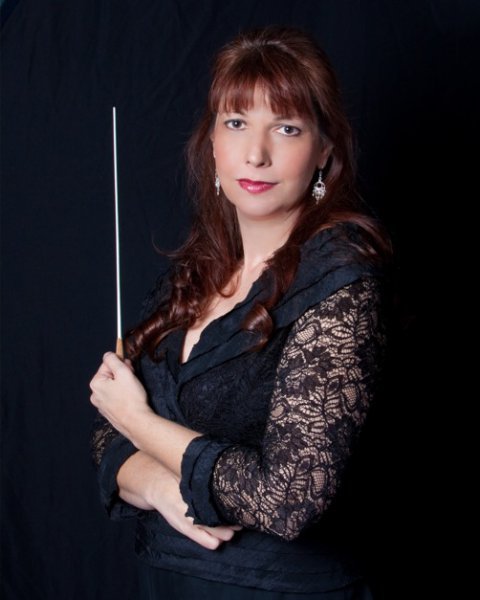Orchestra Miami serves up sturdy Beethoven in Pinecrest
A large audience turned out for an evening of Beethoven on a chilly night Friday at Pinecrest Gardens in the Banyon Bowl. Elaine Rinaldi conducted Orchestra Miami in one of the master’s greatest symphonies and highlights from his only opera.
The free concert opened with a musical detour. The final section of Rossini’s Overture to William Tell certainly was in keeping the evening’s theme of musical heroism but, since vocal excerpts from Fidelio were the main offering on the program’s first half, the overture to Beethoven’s opera would have been more appropriate. Still Rossini’s crowd-pleaser was given a lively ride, highlighted by the fanfares of two stalwart trumpets and crisp string playing.
Music from Act I of Fidelio commenced with the opening scene between the jailer Rocco’s daughter Marzelline and his assistant Jaquino. In the duet “Jetzt, Schätzchen, jetzt sind wir allein,” Matthew Maness brought ardor and a sense of wit to Jaquino’s amorous advances. His bright, well placed tenor blended with Jennifer Tipton’s soubrette soprano to felicitous effect.
A faculty member at Miami’s New World School of the Arts, Tipton exuded charm in Marzelline’s “O wär ich schon mit dir vereint.” Not merely giving a formal concert reading of the aria, Tipton managed to enact a saucy character who dreamed of joy with Fidelio while rejecting Jaquino’s entreaties. Rinaldi and the orchestra struck exactly the right light note with fine accompaniment.
Laura Pedersen lacked the heroic soprano required for Leonora’s “Abscheulicher! Wo elist du hin?” Although her top notes were powerful, Pedersen’s voice tended toward dryness in the middle register. The aria “Komm, Hoffnung” was nobly phrased but Pedersen’s runs in the upper register turned strident. The three obbligato horns were played with spot-on accuracy.
Beethoven’s Symphony No. 3 in E-flat Major was nothing short of revolutionary, a work that changed music forever. Rinaldi’s reading of this monumental score was solid and straightforward if hardly subtle. More varied and detailed dynamics would have been welcome but Rinaldi drew a remarkably large sonority from the 38-member ensemble. There was strength in the first-chair winds with particularly fine solo contributions from clarinetist Richard Hancock, flutist Jared Harrison, oboist Erika Yamada and bassonist Gabriel Beavers.
A measured, weighted traversal of the funeral march was distinguished by the warm and unified string contingent. Rinaldi maintained a fast pace and steady rhythmic articulation in the scherzo although there were a few slips in the treacherous horn trio. The plucked string chords at the outset of the final Allegro molto had incisive presence. Fugal sections were marked by clean instrumental lines and the major theme (which Beethoven also utilized in his Creatures of Prometheus ballet) was ample energy. Some loss of momentum toward the end of the movement was remedied by a rousing coda, horns and trumpets resounding with potent impact.
Many in the audience appeared to be hearing Beethoven’s masterpiece for the first time and their wildly enthusiastic response demonstrated the power, originality and emotional depth this music still conveys two hundred and fifteen years after its creation.
Orchestra Miami repeats the program 4 p.m. Sunday at Gateway Park in Sunny Isles Beach. The concert is free.
Orchestra Miami presents music by Cuban and Cuban-American composers 8 p.m. May 11 at the Freedom Tower in Miami. orchestramiami.org
Posted in Performances
Leave a Comment
Sat Mar 23, 2019
at 12:38 pm
No Comments
